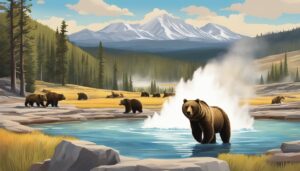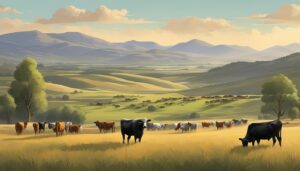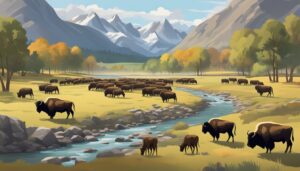Yellowstone, the epic Western drama created by Taylor Sheridan, captivates audiences with its gripping portrayal of the modern American West. Set against the stunning backdrop of Montana, the series weaves together compelling narratives of family, power, and legacy. At its core, Yellowstone explores the complexities of maintaining control over vast tracts of land while navigating the challenges of a changing world.
The show’s themes resonate deeply with viewers, sparking discussions about land rights, wealth disparity, and the preservation of traditional ways of life. Through the lens of the Dutton family’s struggle to maintain their ranch, Yellowstone tackles issues such as corporate interests encroaching on rural communities and the delicate balance between development and conservation. The series also delves into the nuanced relationships between different groups, including Native American tribes and wealthy outsiders seeking to reshape the landscape.
Yellowstone’s cinematic quality and strong ensemble cast contribute to its cultural impact, making it a phenomenon that extends beyond television. By presenting complex characters and morally ambiguous situations, the show invites viewers to contemplate the true meaning of family loyalty, the nature of power, and the evolving identity of the American West in the 21st century.
The Crafting of Yellowstone

Yellowstone’s creation blends visionary storytelling, stunning cinematography, and powerful performances to bring the modern American West to life. The show’s crafting involves meticulous attention to detail in every aspect of production.
Creator and Vision
Taylor Sheridan, the creator of Yellowstone, drew inspiration from his upbringing in West Texas to craft an authentic portrayal of the American West. His vision for the series aimed to explore complex themes of family, power, and land ownership against the backdrop of Montana’s rugged landscapes.
Sheridan’s storytelling approach focuses on character-driven narratives that delve into the conflicts between traditional ranching culture and modern societal pressures. His background as a screenwriter and actor informs his ability to create multifaceted characters and intricate plot lines.
Cinematography and Setting
Yellowstone’s visual style is a crucial element in immersing viewers in the world of the Dutton family. The show’s cinematography captures the breathtaking landscapes of Montana, showcasing vast prairies, towering mountains, and pristine rivers.
The production team utilizes the Chief Joseph Ranch in Darby, Montana, as the primary filming location for the Dutton ranch. This real-life working cattle ranch provides an authentic backdrop for the series.
Filming techniques emphasize wide shots to convey the expansiveness of the wilderness, while intimate close-ups highlight character emotions and interactions. The use of natural lighting enhances the raw beauty of the Western setting.
Casting and Performances
The casting of Yellowstone plays a pivotal role in bringing the characters to life. Kevin Costner’s portrayal of John Dutton anchors the series with his commanding presence and nuanced performance.
Kelly Reilly embodies the complex Beth Dutton with fierce intensity, while Luke Grimes and Wes Bentley bring depth to their roles as the Dutton sons. Cole Hauser’s portrayal of Rip Wheeler has become a fan favorite for his stoic yet loyal character.
The ensemble cast’s chemistry and individual performances contribute to the show’s authenticity. Their ability to convey the emotional weight of family conflicts and power struggles elevates the storytelling.
Understanding the Dutton Family

The Dutton family sits at the heart of Yellowstone’s complex narrative, their relationships and struggles driving much of the show’s drama. Their fierce loyalty and internal power dynamics shape each character’s journey and decisions.
Family Loyalty and Dynamics
The Duttons exhibit unwavering loyalty to their land and legacy. John Dutton, the family patriarch, leads with an iron will to preserve their vast ranch. His children – Beth, Kayce, and Jamie – navigate complex relationships with their father and each other.
Family conflicts often arise from differing ideologies and personal ambitions. Beth’s sharp business acumen clashes with Jamie’s political aspirations. Kayce struggles between his loyalty to the ranch and his own family.
These internal power struggles mirror larger themes in the series, reflecting the harsh realities of maintaining power in the modern West.
Individual Characters
John Dutton stands as the formidable leader, fiercely protective of his land and family legacy. His methods can be brutal but effective in ensuring the ranch’s survival.
Beth Dutton, known for her intelligence and ruthlessness, serves as a key strategist in family affairs. Her complex relationship with Rip Wheeler adds depth to her character.
Kayce Dutton often finds himself torn between family obligations and personal desires. His military background influences his approach to ranch conflicts.
Jamie Dutton’s legal expertise and political ambitions frequently put him at odds with family interests, creating tension and drama.
Rip Wheeler, though not a blood relation, plays a crucial role as the loyal ranch foreman, embodying the Dutton family’s values and methods.
Themes and Symbolism

Yellowstone explores complex themes through its characters and setting. The show weaves together ideas of power, family, and the American West to create a rich tapestry of meaning.
Power and Corruption
The Dutton family’s struggle to maintain control of their ranch illustrates the corrupting nature of power. John Dutton wields his influence to protect his interests, often blurring ethical lines. His children vie for position within the family hierarchy, revealing how power can strain relationships.
Political and corporate forces also play a role, showing how money and influence shape the modern West. The series depicts backroom deals and leverage tactics used by various factions to gain an upper hand.
Moral ambiguity permeates these power dynamics. Characters make difficult choices, forcing viewers to question their own values and the price of success.
Land Ownership and Rights
The central conflict in Yellowstone revolves around land. The Dutton Ranch symbolizes a disappearing way of life in the American West. Native American tribes assert their historical claims, while developers seek to exploit natural resources.
This struggle highlights tensions between preservation and progress. The show explores the legal and cultural complexities of land rights in Montana.
Characters debate the responsibilities of land stewardship. John Dutton sees himself as a guardian of tradition, while others view his control as outdated and unjust.
Family Legacy and Survival
The Dutton family’s efforts to preserve their dynasty drive much of the show’s drama. Each generation grapples with the weight of expectations and the desire to forge their own path.
Loyalty clashes with individual ambition as siblings compete for their father’s approval. The series examines how family bonds can both strengthen and constrain its members.
Survival takes on multiple meanings – from the literal protection of the ranch to the continuation of the Dutton name and values. Characters must adapt to changing times while honoring their heritage.
The show portrays the evolution of Western identity and culture through the lens of this family’s struggles.
Cultural and Societal Reflections

Yellowstone offers a nuanced portrayal of modern Western life, exploring the tensions between tradition and progress. The show captures the complexities of cultural preservation, indigenous rights, and the changing face of the American West.
Representation of the American West
Yellowstone paints a vivid picture of the contemporary American West. The sprawling landscapes serve as more than mere backdrops, becoming central characters that shape the narrative. The series depicts the struggles of modern ranching, highlighting the challenges faced by families like the Duttons in maintaining their way of life.
The show doesn’t shy away from portraying the darker aspects of Western culture, including political corruption and corporate greed. These elements add depth to the storytelling, reflecting real-world issues that plague many rural communities.
Yellowstone’s portrayal of cowboy culture and ranching traditions resonates with viewers, tapping into a nostalgic vision of the West while acknowledging its evolution.
Modern Challenges in Western Life
The series tackles numerous challenges facing the modern West. Economic pressures, land disputes, and environmental concerns feature prominently in the storylines. The Dutton family’s struggle to keep their ranch reflects broader issues of land ownership and use in the region.
Yellowstone explores the impact of modernization on traditional ways of life. The clash between old and new is evident in conflicts over resource management, tourism, and development. These themes mirror real-world debates about the future of the American West.
The show also addresses social issues like drug abuse and poverty, providing a more complete picture of life in rural areas. This nuanced approach contributes to Yellowstone’s cultural impact and resonance with viewers.
Cultural Preservation and Indigenous Rights
Yellowstone brings indigenous rights and cultural preservation to the forefront through characters like Thomas Rainwater. The series explores the complex relationships between Native American tribes and non-native residents, highlighting historical injustices and ongoing struggles.
Land rights form a central theme, with the show depicting conflicts between tribal interests and those of ranchers and developers. These storylines reflect real-world tensions over resource allocation and cultural heritage sites.
The series also touches on efforts to preserve indigenous languages and traditions, showcasing the importance of cultural continuity. By giving voice to Native American characters, Yellowstone contributes to broader discussions about representation in media and society.
Yellowstone’s Place in Media

Yellowstone has become a cultural juggernaut, reshaping perceptions of the American West and influencing popular culture. The show’s impact extends far beyond television, touching various aspects of society and entertainment.
Influence on Fashion and Tourism
Yellowstone’s portrayal of ranch life has sparked a resurgence in Western fashion. Cowboy hats, boots, and denim have seen increased popularity among viewers. Major retailers have capitalized on this trend, creating Yellowstone-inspired clothing lines.
The show’s stunning landscapes have boosted tourism in Montana and Wyoming. Fans flock to filming locations, eager to experience the rugged beauty of the American West firsthand. Local businesses have benefited from this influx of visitors, offering tours and merchandise related to the series.
Yellowstone Ranch itself has become an iconic symbol, inspiring real estate trends and a renewed interest in ranch ownership among affluent viewers.
Spin-Off Series and Expansions
Yellowstone’s success has led to an expanded universe of related content. The prequel series “1883” explores the Dutton family’s origins, while “1923” continues the family saga in the early 20th century.
These spin-offs have attracted A-list talent, including Sam Elliott, Tim McGraw, and Harrison Ford. They’ve helped solidify Yellowstone’s place as a multi-generational epic, appealing to diverse audiences.
The expanded universe has allowed for deeper exploration of historical themes and the evolution of the American West, enriching the overall storytelling experience.
The Show’s Legacy in Western Genre
Yellowstone has revitalized the Western genre for modern audiences. Its blend of traditional Western elements with contemporary issues has attracted viewers who might not typically engage with the genre.
The show’s cinematic quality, with sweeping vistas and attention to detail, has set a new standard for television production. It has inspired other networks to invest in high-quality Western-themed content.
Yellowstone’s exploration of timeless themes like family loyalty, power struggles, and land rights has demonstrated the enduring relevance of Western storytelling. It has paved the way for a new generation of Western dramas that tackle complex, modern issues within a familiar genre framework.
Controversies and Real-World Parallels
Yellowstone tackles controversial issues that mirror real conflicts in the American West. The show explores tensions between ranchers, Native American tribes, government entities, and corporate interests.
Government and Corporate Challenges
The Dutton family’s struggles to maintain control of their ranch reflect actual land disputes in Montana and surrounding states. Ranchers face pressure from developers, environmental regulations, and corporate interests seeking to exploit natural resources.
Federal agencies like the Bureau of Land Management play a significant role in these conflicts. In Yellowstone, government officials often clash with the Duttons over land use and conservation efforts.
The oil industry’s presence in the show mirrors its real-world impact on Western landscapes. Landmen, who negotiate mineral rights, feature prominently as both allies and adversaries to the Duttons.
Justice and Moral Questions
Yellowstone portrays a world where justice is often subjective and morally ambiguous. Characters frequently operate in legal gray areas, mirroring real-life concerns about corruption and abuse of power in rural communities.
The show explores how wealth and political connections can influence law enforcement and the judicial system. This reflects actual debates about equality under the law in areas with powerful landowners.
Conflicts between tribal police, county sheriffs, and state authorities in Yellowstone echo jurisdictional issues on reservations. These complex legal relationships create challenges for real-world law enforcement in the West.
Impact and Reception

Yellowstone has become a cultural phenomenon, captivating audiences with its portrayal of the modern American West. The show’s exploration of family dynamics, power struggles, and rural issues has resonated deeply with viewers across the country.
Critical Acclaim and Audience Response
Yellowstone has garnered widespread critical acclaim and a devoted fan base. The series consistently achieves high ratings, with millions of viewers tuning in for each episode. Critics praise the show’s stunning cinematography, complex characters, and nuanced storytelling.
Kevin Costner’s portrayal of John Dutton has been particularly lauded, earning him a Golden Globe nomination. The ensemble cast’s performances have also received recognition, contributing to the show’s overall success.
Fans appreciate Yellowstone’s authentic depiction of ranch life and the challenges faced by rural communities. The series has sparked online discussions and fan theories, further cementing its place in popular culture.
Insights into American Society
Yellowstone offers a unique lens through which to examine contemporary American society. The show delves into issues of land ownership, generational conflict, and the preservation of traditional ways of life in the face of modernization.
The Dutton family’s struggles reflect broader tensions in American society, such as:
- Rural vs. urban interests
- Native American rights and land disputes
- Environmental conservation vs. economic development
Yellowstone’s exploration of family loyalty and identity resonates with viewers, prompting reflection on personal values and cultural heritage. The series has reinvigorated interest in Western-themed entertainment and sparked conversations about the changing face of the American West.



